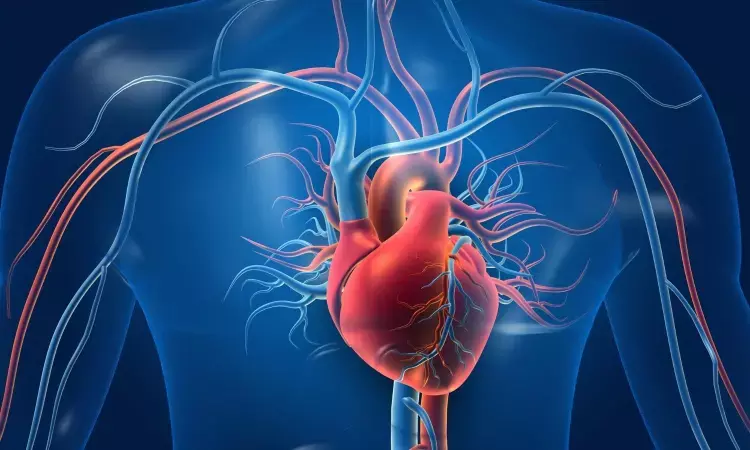- Home
- Medical news & Guidelines
- Anesthesiology
- Cardiology and CTVS
- Critical Care
- Dentistry
- Dermatology
- Diabetes and Endocrinology
- ENT
- Gastroenterology
- Medicine
- Nephrology
- Neurology
- Obstretics-Gynaecology
- Oncology
- Ophthalmology
- Orthopaedics
- Pediatrics-Neonatology
- Psychiatry
- Pulmonology
- Radiology
- Surgery
- Urology
- Laboratory Medicine
- Diet
- Nursing
- Paramedical
- Physiotherapy
- Health news
- Fact Check
- Bone Health Fact Check
- Brain Health Fact Check
- Cancer Related Fact Check
- Child Care Fact Check
- Dental and oral health fact check
- Diabetes and metabolic health fact check
- Diet and Nutrition Fact Check
- Eye and ENT Care Fact Check
- Fitness fact check
- Gut health fact check
- Heart health fact check
- Kidney health fact check
- Medical education fact check
- Men's health fact check
- Respiratory fact check
- Skin and hair care fact check
- Vaccine and Immunization fact check
- Women's health fact check
- AYUSH
- State News
- Andaman and Nicobar Islands
- Andhra Pradesh
- Arunachal Pradesh
- Assam
- Bihar
- Chandigarh
- Chattisgarh
- Dadra and Nagar Haveli
- Daman and Diu
- Delhi
- Goa
- Gujarat
- Haryana
- Himachal Pradesh
- Jammu & Kashmir
- Jharkhand
- Karnataka
- Kerala
- Ladakh
- Lakshadweep
- Madhya Pradesh
- Maharashtra
- Manipur
- Meghalaya
- Mizoram
- Nagaland
- Odisha
- Puducherry
- Punjab
- Rajasthan
- Sikkim
- Tamil Nadu
- Telangana
- Tripura
- Uttar Pradesh
- Uttrakhand
- West Bengal
- Medical Education
- Industry
Alirocumab benefits CAD patients only if lipoprotein (a) levels elevated: Study

In patients with recent acute coronary syndromes PCSK9 inhibitor alirocumab provides substantial clinical benefit only when lipoprotein(a) concentration is mildly increased, suggests a study published in the Journal of American College of Cardiology.
Various Guidelines recommend non-statin lipid-lowering agents in patients at very high risk for major adverse cardiovascular events (MACE) if low-density lipoprotein cholesterol (LDL-C) remains ≥70 mg/dL on maximum tolerated statin treatment. It is uncertain if this approach benefits patients with LDL-C near 70 mg/dL. Lipoprotein(a) levels may influence residual risk.
A post hoc analysis of the ODYSSEY Outcomes (Evaluation of Cardiovascular Outcomes After an Acute Coronary Syndrome During Treatment With Alirocumab) trial was performed by a group of authors from U.S.A. to evaluate the benefit of adding the proprotein subtilisin/Kexin type 9 inhibitor alirocumab to optimized statin treatment in patients with LDL-C levels near 70 mg/dL. Effects were evaluated according to concurrent lipoprotein(a) levels.
The researchers conducted the ODYSSEY Outcomes, wherein they compared alirocumab with placebo in 18,924 patients with recent acute coronary syndromes receiving optimized statin treatment. In 4,351 patients (23.0%), screening or randomization LDL-C was <70 mg/dL; in 14,573 patients (77.0%), both determinations were ≥70 mg/dL.
The results of the study are as follows:
- In the lower LDL-C subgroup, MACE rates were 4.2 and 3.1 per 100 patient-years among placebo-treated patients with baseline lipoprotein(a) greater than or less than or equal to the median (13.7 mg/dL).
- Corresponding adjusted treatment hazard ratios were 0.68, with treatment-lipoprotein(a) interaction on MACE (Pinteraction = 0.017).
- In the higher LDL-C subgroup, MACE rates were 4.7 and 3.8 per 100 patient-years among placebo-treated patients with lipoprotein(a) >13.7 mg/dL or ≤13.7 mg/dL; corresponding adjusted treatment hazard ratios were 0.82 and 0.89, with Pinteraction = 0.43.
The researchers concluded that in patients with recent acute coronary syndromes and LDL-C near 70 mg/dL on optimized statin therapy, proprotein subtilisin/kexin type 9 inhibition provides incremental clinical benefit only when lipoprotein(a) concentration is at least mildly elevated.
Reference:
Lipoprotein(a) and Benefit of PCSK9 Inhibition in Patients With Nominally Controlled LDL Cholesterol by Schwartz G et. al published in the J Am Coll Cardiol.
https://www.jacc.org/doi/abs/10.1016/j.jacc.2021.04.102
Dr. Shravani Dali has completed her BDS from Pravara institute of medical sciences, loni. Following which she extensively worked in the healthcare sector for 2+ years. She has been actively involved in writing blogs in field of health and wellness. Currently she is pursuing her Masters of public health-health administration from Tata institute of social sciences. She can be contacted at editorial@medicaldialogues.in.
Dr Kamal Kant Kohli-MBBS, DTCD- a chest specialist with more than 30 years of practice and a flair for writing clinical articles, Dr Kamal Kant Kohli joined Medical Dialogues as a Chief Editor of Medical News. Besides writing articles, as an editor, he proofreads and verifies all the medical content published on Medical Dialogues including those coming from journals, studies,medical conferences,guidelines etc. Email: drkohli@medicaldialogues.in. Contact no. 011-43720751


